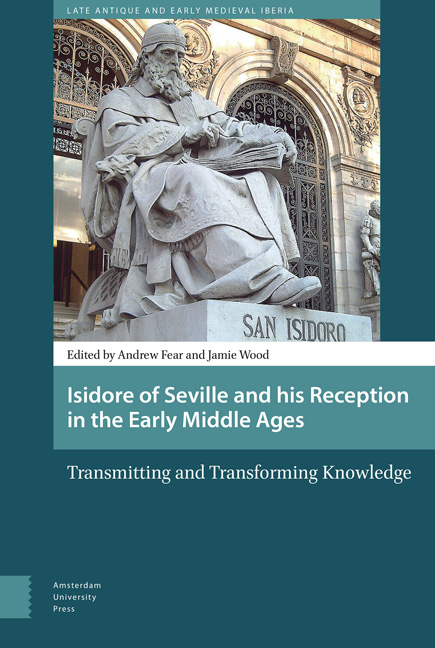 Isidore of Seville and his Reception in the Early Middle Ages
Isidore of Seville and his Reception in the Early Middle Ages Book contents
- Frontmatter
- Contents
- Preface: Paul Fouracre, University of Manchester
- 1 Introduction
- 2 A Family Affair: Leander, Isidore and the Legacy of Gregory the Great in Spain
- 3 Variations on a Theme: Isidore and Pliny on Human and Human-Instigated Anomaly
- 4 Putting the Pieces Back Together: Isidore and De Natura Rerum
- 5 The Politics of History-Writing: Problematizing the Historiographical Origins of Isidore of Seville in Early Medieval Hispania
- 6 Isidorian Texts in Seventh-Century Ireland
- 7 Isidore of Seville in Anglo-Saxon England: The Synonyma as a Source of Felix’s Vita S. Guthlaci
- 8 Hispania et Italia: Paul the Deacon, Isidore, and the Lombards
- 9 Rylands MS Latin 12: A Carolingian Example of Isidore’s Reception into the Patristic Canon
- 10 Adoption, Adaptation, & Authority: The Use of Isidore in the Opus Caroli
- Abbreviations
- Index
6 - Isidorian Texts in Seventh-Century Ireland
Published online by Cambridge University Press: 12 December 2020
- Frontmatter
- Contents
- Preface: Paul Fouracre, University of Manchester
- 1 Introduction
- 2 A Family Affair: Leander, Isidore and the Legacy of Gregory the Great in Spain
- 3 Variations on a Theme: Isidore and Pliny on Human and Human-Instigated Anomaly
- 4 Putting the Pieces Back Together: Isidore and De Natura Rerum
- 5 The Politics of History-Writing: Problematizing the Historiographical Origins of Isidore of Seville in Early Medieval Hispania
- 6 Isidorian Texts in Seventh-Century Ireland
- 7 Isidore of Seville in Anglo-Saxon England: The Synonyma as a Source of Felix’s Vita S. Guthlaci
- 8 Hispania et Italia: Paul the Deacon, Isidore, and the Lombards
- 9 Rylands MS Latin 12: A Carolingian Example of Isidore’s Reception into the Patristic Canon
- 10 Adoption, Adaptation, & Authority: The Use of Isidore in the Opus Caroli
- Abbreviations
- Index
Summary
When working in the 1980s on elucidating the cosmological views current in Ireland during the seventh century, I came to question the prevailing assumption that Isidorian works such as the Etymologiae and De natura rerum were available in Ireland already ca. 650. It had become clear to me that whereas Hiberno-Latin texts of the third quarter of the seventh century shared much technical terminology with those two Isidorian treatises, the Irish authors did not understand the meaning of these words. Hiberno- Latin texts assigned to the mid-years of the seventh century had been adduced as evidence for early borrowings from Isidore of Seville (d. 636). Variations on statements such as ‘… We can now be almost completely confident that the writings of Isidore were known in Ireland in the 650s. In the case of the Etymologies, it is at least possible that that work reached Ireland before the middle of the seventh century’ were commonplace in the field. This conviction led to the assignation of Hiberno-Latin texts to specific periods of the seventh century. Thus, for example, Aidan Breen concluded from his demonstration that the Commentarius in Epistolas Catholicas Scotti Anonymi was not influenced by the Etymologiae – contrary to previous belief – that ‘since the text, however, emanated from that very scholastic environment to which the works of Isidore were first introduced in Ireland, a date of 660 seems highly unlikely. In all probability, the text predates 650’. Luned Mair Davies gave a very clear and concise account of the state of the question in the mid-nineties in her paper on Isidorian texts and the Canones Hibernenses, but readers may not think to seek this information in the study of a text generally dated to c. AD 700 or later.
An early transmission of Isidore's works to a remote island lying to the west of northern continental Europe was explained by the high level of classical culture and stability in the Visigothic kingdom at that time, combined with maritime routes from northern Spain to Ireland. Jonathan Wooding has pointed out: ‘The presence, or non-presence, of trade routes is not in itself proof of the likelihood of the transmission of texts’, and he feels that the ‘pre-eminence of Spanish learning in the sixth and seventh centuries was sufficient that its influence was dominant’.
- Type
- Chapter
- Information
- Isidore of Seville and his Reception in the Early Middle AgesTransmitting and Transforming Knowledge, pp. 111 - 130Publisher: Amsterdam University PressPrint publication year: 2016
- 1
- Cited by
